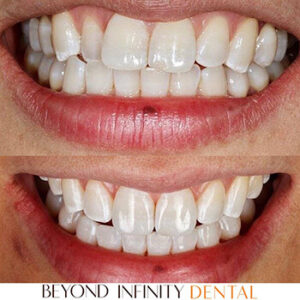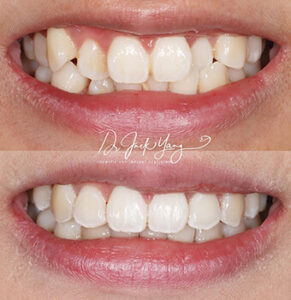If you’re wondering about dental veneers, you’re not alone! You may have been considering this cosmetic treatment for teeth but are not entirely sure whether the treatment is for you, especially if you’ve never had any experience with cosmetic dentistry before. Here, we’ll take a look at veneers for teeth pros and cons so that you can decide whether they’re right for you!
What are veneers?
Dental veneers are used for aesthetic purposes only to make teeth appear better in terms of shape, size, and colour and do not fix any dental health issues. They are a thin, shell-like sliver of material attached to the front of the teeth, effectively disguising the tooth behind it and presenting a straight, white smile. Veneers are typically made from porcelain or composite. But what exactly are the pros and cons of these materials for teeth veneers? Let’s take a look.
 Porcelain Veneers
Porcelain Veneers
Porcelain veneers are a common and popular solution for creating a smile makeover that is even and bright while closing gaps, covering cracks or chips and disguising discolouration.
Even for people with crooked teeth, veneers can make them look straight without needing time-consuming orthodontic work, such as braces, that can take a couple of years to achieve the desired change and result.
Some of the main advantages and disadvantages of porcelain veneers are:
Pros
- You can have the smile of your dreams in a short time. Typically, it will require 2 or 3 dental appointments to be assessed, measured up and have your porcelain veneers attached.
- Porcelain veneers are resistant to stains, so your smile will remain white and youthful-looking for longer.
- Provided they are looked after properly, porcelain veneers have a long lifespan of between ten to fifteen years.
- No special maintenance is required for porcelain veneers, providing you adhere to a thorough twice-daily dental hygiene routine of brushing and flossing, supplemented by regular dental check-ups.
- Porcelain is natural-looking and has qualities that mimic natural teeth—achieving an excellent cosmetic result.
- If you are embarrassed by your teeth, porcelain veneers can improve your self-esteem and increase your self-confidence.
Cons
- The dentist has to remove a thin slither of tooth enamel to help the veneers adhere better and ensure they fit flush with the smile. Usually, the amount of porcelain removed is the same thickness as the veneer.
- As the tooth structure is changed to accommodate porcelain veneers, the procedure is considered to be a permanent procedure and is not reversible.
- It is not uncommon to have some sensitivity after your teeth have been prepared to receive your new veneers. It could take a few weeks to get used to teeth that may have changed size, shape and spacing, and your speech may be affected. However, after a month or so, your new smile will feel like part of you.
- Although porcelain veneers are strong, you should avoid doing anything that can damage them, such as biting your fingernails or crunching ice.
- Conditions such as bruxism, clenching, or grinding your teeth can damage veneers, so you may have to consider wearing a nightguard if you want to protect your smile.
- Porcelain is more expensive than composite resin material.
Composite Dental Veneers
With the advance in technology in the dental field, new materials are developed all the time—and while traditionally, veneers were made from porcelain, another popular material in use is composite resin — a plastic-like material also used for dental fillings. Take a look at the pros and cons of composite veneers for teeth to help you make an informed choice:
Pros
- Composite dental veneers can be made and applied in just one dental visit —so the procedure is extremely quick. You can have your new smile in a day.
- The process is performed by a dentist who colour-matches the composite resin and sculpts it onto your teeth—rather than the veneers being made in an offsite lab. The resin is hardened with a high-intensity light before the veneers are polished to mimic the sheen of natural teeth.
- Little or no preparation of the teeth is required beforehand, so the procedure for composite dental veneers is not considered permanent.
- Composite dental veneers can be removed entirely as the tooth structure is not altered.
- Composite dental veneers are considerably less expensive than porcelain, which can mean substantial savings on a smile makeover.
Cons

- Composite dental veneers are not as durable as porcelain and only have a lifespan of around 5-7 years.
- Composite resin is more porous than porcelain and is more prone to staining. You may have to adjust your diet and refrain from consuming food and drinks that can stain your veneers.
- Like other veneers, you will need to ensure you do not damage them by biting your fingernails or crunching ice cubes.
- If you grind your teeth or clench your jaw in your sleep, you may have to wear a night guard while you sleep to prevent damage to your dental veneers.
- Composite veneers may not be suitable for severe defects, for example, large spacing issues or significant discolouration of the teeth.
Veneers For Teeth Pros and Cons – The Bottom Line
Dental veneers are an excellent option for quickly improving your smile, but you should speak to us about whether porcelain veneers or composite are the best option for you. We will ask about your smile goals and consider your oral health, tooth alignment and budget.
Indeed, if the budget is all-important, composite dental veneers may suit you. However, if aesthetics are your primary concern, then porcelain could be a better fit. At the end of the day, it’s worth chatting with us about the pros and cons of the various types of dental veneers available to you, so schedule an appointment and call us on (02) 8806 3799 today.
References
Web MD: Dental veneers
https://www.webmd.com/oral-health/guide/veneers
Mayo Clinic: Bruxism (teeth grinding)
https://www.mayoclinic.org/diseases-conditions/bruxism/symptoms-causes/syc-20356095
Healthline: Everything you need to know about composite veneers
https://www.healthline.com/health/composite-veneers









